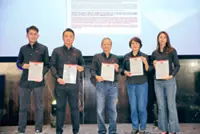GENEVA: More steps to free up trade globally have been taken since Donald Trump was elected than measures to restrict it, the World Trade Organisation (WTO) said, despite concerns his administration would introduce a raft of punitive rules to protect US jobs.
The WTO’s global monitoring report, debated at a trade policy review on Monday, covers October 2016 to May 2017.
“The report shows an encouraging decrease in the rate of new trade-restrictive measures put in place - hitting the lowest monthly average since the financial crisis,” WTO director-general Roberto Azevedo said in a statement.
The semi-annual report, largely coinciding with the period since the election of US. President Donald Trump, showed that the 164 WTO members put 74 new restrictive measures in place, including tariffs, customs regulations and quantitative restrictions, with an impact of US$49bil (RM209.6bil) of trade.
At the same time, they took 80 steps to help trade, such as cutting tariffs or simplifying customs procedures, affecting a much bigger US$183bil (RM782.9bil) of trade.
Trade-restrictive steps peaked at 22 per month in 2011, roughly twice the level in the period of the latest report.
During the period under review, the United States introduced new restrictions including a provisional duty on Canadian softwood lumber, suspecting it of being unfairly priced.
It also brought in ”Buy America” provisions to ensure that, subject to some conditions, state loan funds are not used for water infrastructure projects unless all the steel used in the project was produced in the United States, the WTO report said.
Trump had also liberalised trade by scrapping broadband privacy rules, allowing Internet service providers to commercialise user data without explicit permission from the US Federal Communications Commission, the report said.
China, routinely the WTO member most often accused of unfair pricing and illegal subsidies, had introduced new restrictions with a cybersecurity law, requiring data generated in China to be stored in China, and a film production law, requiring Chinese movies get two-thirds of the screen time at Chinese cinemas.
But it also eased approval requirements for foreign-owned banks to invest in Chinese banks and to supply some investment banking services in China, the WTO report said. - Reuters





